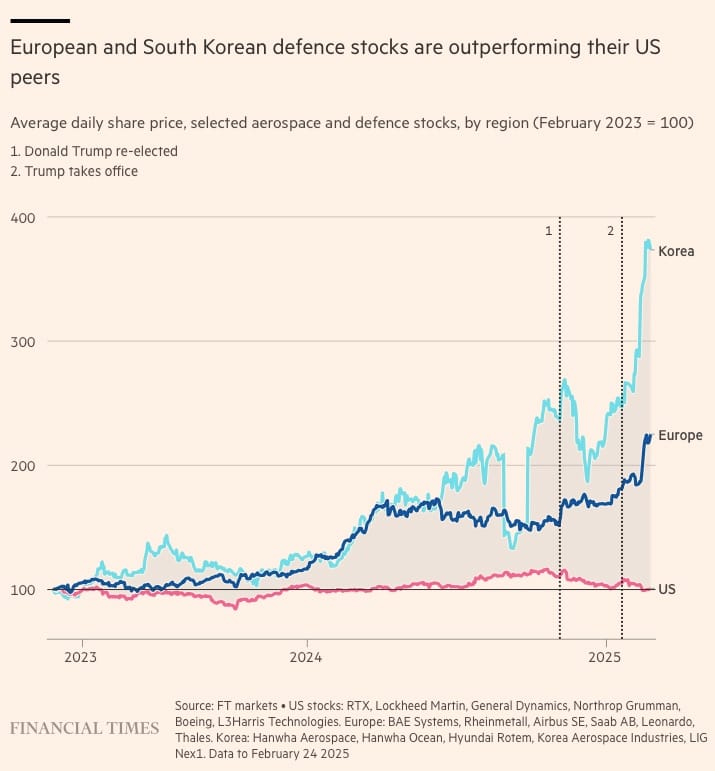February 25 2025
US defense giants lag global peers as Trump foreign policy takes shape; Cyber chief warns of adversaries; GOP budget agenda; Shutdown fears rise; Germany’s image fades

1. US Defense Giants Lag as Europe, South Korea Surge Amid Trump’s Pentagon Cuts
2. Former Cyber Chief Warns US Losing Ground to Adversaries in Cyberspace
3. Republicans Split on Trump’s Agenda as Reconciliation Bills Diverge
4. Shutdown Fears Lurk in Background of Budget Talks
5. Germany’s Economic Decline
February 25, 1964: Young Muhammad Ali knocks out Sonny Liston for first world title
GET THE CITIZEN JOURNAL APP - FREE!
1. US Defense Giants Lag as Europe, South Korea Surge Amid Trump’s Pentagon Cuts
The US’s top defence companies are missing out on the sector’s global rally after Donald Trump called on Europe to spend more on its own security while also vowing to cut the Pentagon’s budget. Shares in the six largest US defence companies have fallen 4 per cent on average since Trump returned to the White House, while those of Europe’s top defence groups, led by Germany’s Rheinmetall, have surged almost 40 per cent in the same period. South Korea’s defence companies have also emerged as winners as they tap into Europe’s rearmament drive. Shares in Hanwha Aerospace, the country’s largest player which has benefited from demand from Nato countries such as Poland and Romania, have risen more than 70 per cent.

Article Source: FT
2. Former Cyber Chief Warns US Losing Ground to Adversaries in Cyberspace
The United States is falling “increasingly behind” its adversaries in cyberspace, a former Cyber Command and National Security Agency boss said Saturday. Speaking at the DistrictCon cybersecurity conference in Washington, D.C., retired Gen. Paul Nakasone said that “our adversaries are continuing to be able to broaden the spectrum of what they’re able to do to us.” Nakasone said incidents like Chinese government-backed breaches of U.S. telecommunications companies and other critical infrastructure — as well as a steady drumbeat of ransomware attacks against U.S. targets — illustrate “the fact that we’re unable to secure our networks, the fact that we’re unable to leverage the software that’s being provided today, the fact that we have adversaries that continue to maintain this capability.” Nakasone, who led NSA and CYBERCOM from 2018 until early last year and is now founding director of Vanderbilt University’s Institute of National Security, said he fears the threats of the future are only going to get more dangerous. One example is “we are starting to see the beginnings of the bleed from the non-kinetic to the kinetic for cyber operations,” he said, referring to actual physical damage. “What’s next is that we are going to see cyberattacks against a series of platforms being able to actually down platforms with ones and zeros,” Nakasone said.
Article Source: Cyber Scoop
3. Republicans Split on Trump’s Agenda as Reconciliation Bills Diverge
As Republicans gear up to enact President Donald Trump’s ambitious agenda, Congress finds itself split between two distinct tracks for a reconciliation bill, each with significant implications. Reconciliation, a budget process allowing bills to pass with a simple majority and avoid Senate filibusters, is the GOP’s chosen weapon to push Trump’s priorities through a narrowly divided Congress. The House version, endorsed by Trump as “one big beautiful bill,” aims to tackle his full America First agenda in a single, sweeping package—border security, energy reforms, and a hefty $4.5 trillion tax cut extension from his 2017 law, offset by deep spending reductions. This all-in-one approach, set for a vote next week, promises a unified GOP front but risks collapse under the party’s razor-thin House majority if internal divisions falter. Meanwhile, the Senate, led by figures like Lindsey Graham, is pursuing a leaner, two-bill strategy, starting with a $340 billion package focused on border security, defense, and energy, leaving tax cuts for a later measure. This phased plan, already passed by the Senate on Friday, offers quicker wins for Trump but could delay or derail his broader tax promises, frustrating his vision of a singular, transformative legislative triumph. With Trump’s vocal backing amplifying the House’s efforts, the chambers are locked in a high-stakes race, testing Republican unity and the feasibility of his grandiose legislative dreams.
Article Source: citizen journal
4. Shutdown Fears Lurk in Background of Budget Talks
A Capitol Hill clash over President Donald Trump’s extraordinary moves to take control of federal spending is upping the chances that lawmakers won’t have a deal to fund the government before a shutdown deadline in just three weeks. Talks between the top appropriators in the House and Senate have soured in the past week, with lawmakers still searching for an agreement on topline spending levels that are a prerequisite for funding individual agencies and programs for the remainder of the fiscal year. Negotiators have insisted they are staying at the table to hash out an accord. But there’s no clear strategy to break the logjam, and House Republican leaders privately acknowledge that contingency plans need to be drawn up in case the impasse continues ahead of the March 14 deadline.
Article Source: Politico
5. Germany’s Economic Decline
When I recently picked up a rental car in Las Vegas — I was in America to cover the elections — the agent at the counter insisted on “upgrading” me to a BMW. “So you feel at home,” he said, looking at my German driver’s license, smiling. I took the keys and made a mental note: Outside Germany, Germany is still intact. I often find this when I travel. Outside Germany, Germany is still a car country, home to a flourishing economy. Outside Germany, Germany is still a prosperous country, where everybody drives a BMW or the like. Outside Germany, Germany is still a well-ordered country, a pleasant place both politically and socially. I smiled back at the agent. But inwardly, I winced. Because in Germany, Germany doesn’t feel like Germany anymore.
Article Source: NYT
February 25, 1964: Young Muhammad Ali knocks out Sonny Liston for first world title
See the Ad Astra Podcast! Released on Apple and Spotify around 10a CST.
Sponsors (click me!)










Sources
1. https://www.ft.com/content/1ea4a5d6-c8a9-4a87-8e3a-9a7c084d1a77
2. https://cyberscoop.com/former-nsa-cyber-command-chief-paul-nakasone-enemies-cyberspace/
3. self
4. https://www.politico.com/news/2025/02/21/congress-shutdown-funding-trump-00205514
5. https://www.nytimes.com/2024/12/17/opinion/germany-scholz-government-election.html
